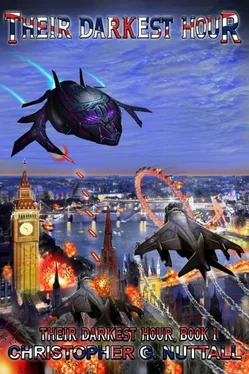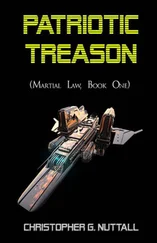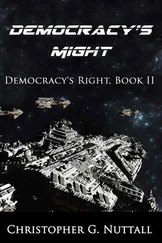Some of the citizens were staring at the policemen with sullen, angry faces. Others seemed too nervous to care, or were perhaps even relieved that they were dealing with human police, rather than aliens. Some probably didn’t even believe in the aliens. The internet — what was left of it — had included a conspiracy theory that suggested that there had really been a military coup and the whole story of aliens was intended to keep the British public quiet while the Generals took over. Robin might have been tempted to believe the story if he hadn’t seen the aliens. They were chillingly real.
The lines snaked towards the civil servants, who started processing the citizens with bland indifference. They’d been told to bring ID — driving licences or passports — which suggested to Robin that the aliens had managed to capture almost all of the government’s records. There would be no chance for anyone to change their name and identity in the chaos, not if the aliens — and their collaborators — had anything to say about it. Robin silently prayed that everything would go perfectly, without him and his men having to intervene. God alone knew how the aliens would react if they had to run the city on their own. They could simply leave the civilian population to starve…
“Here,” one oversized man bellowed, suddenly. “How am I supposed to eat this, you dozy cow?”
Robin started towards him, one hand dropping to the truncheon at his belt. The man was staring at a package of food from the piles behind the tables, food produced by the aliens. Robin had had a taste and wondered if anyone could actually be induced to like the stuff — it tasted faintly of leather, at best. The aliens insisted that the semi-bread was good to feed a family for four for several days, but Robin knew better. If nothing else, eating the same bland food for more than a few days would be severely demoralising.
“You cut it up and you put it in your mouth,” the civil servant repeated in the same bored tone. She’d been working for the Department of Transportation before the aliens had arrived, just another pen-pusher in a department that had more pen-pushers than it had drivers or engineers. “It’s perfectly simple…”
“It’s muck,” the man proclaimed, loudly. There was a murmur of agreement from several in the crowd. The lines were starting to jostle. “I can’t feed my family on this shit!”
Robin caught his arm. “That’s enough, sir,” he said, trying to project a mixture of stern warning and the promise of excessive violence into his voice. They’d been told that appearing confident and unmoveable would prevent people from trying to pick fights with the police. Personally, Robin would have preferred a year of hard labour for each yob who thought he could get away with chucking a beer bottle at a hard-working policeman. “The lady’s just doing her job…”
The man swung around and threw a punch at Robin, who jumped back automatically, whipping out his truncheon. A lady — a sad, beating-looking mother of two kids — tried to hold her husband back, but he shrugged off her arm and came after Robin. Robin didn’t hesitated; he carefully lashed out with his truncheon, hitting the man in the chest. He folded over and hit the floor with a terrific crash. It would have been a media circus in the old days, with reports of police brutality hitting the airwaves faster than light, but now… he shivered as he realised that they could get away with almost anything, as long as they obeyed the aliens. The thought was terrifying. He knew dozens of coppers who would have liked to take the gloves off and just teach young hooligans some respect the hard way. What would they do without restraints?
He pushed the thought aside as he used a plastic tie to secure the man and then dragged him into a corner. “Don’t worry about him,” he said, to his wife. She was on the verge of either crying or lashing out at him herself. He couldn’t really blame her for either. “I’ll try to see to it that he gets back home ok.”
The lines moved quicker now that the police had shown that they were ready to deal with any challenge. It didn’t get any easier. Crying children constantly drowned out every other sound, despite the frantic attempts by their parents to calm them down. Older children looked around, bemused by what they were seeing, while their parents were clearly terrified. Robin understood just how they were feeling. The world — the world they’d grown up in — was no more. All of the old certainties were gone.
He caught sight of a dozen different ethnic groups and winced inwardly. Indians and Pakistanis, Arabs and Jamaicans… some from communities that had a long history of confrontation with the police. He had to wade in to stop a Pakistani man from attacking one of the civil servants, apparently outraged because he’d been told that his wife had to remove her veil. The mood in the building rapidly turned ugly, but he resisted the urge to call for backup. An alien patrol with live weapons would arrive and probably shoot a few dozen innocent citizens to restore order. That was the last thing he wanted.
Another scuffle caught his eye, one that seemed to spring out of nowhere — and then he saw the ID card. It was a military ID, one that identified its bearer as a serving member of the Royal Navy. He didn’t want to act, but there was no choice. The policemen closed in rapidly and led the sailor away, leaving his wife behind. They’d been given no choice in the matter — all serving members of the military, whatever the service, were to be arrested and handed over to the aliens. He told himself that the sailor would have a chance to escape — they’d carefully not secured the holding area they’d made in one of the classrooms — but it was small comfort. The eyes of the sailor’s wife and baby child would haunt his nightmares for the rest of time.
Dear God , he prayed, silently. Please let this be over soon .
He ran through the figures in his head. The population of Greater London was estimated at around eight million. Some would have died in the fighting, or in the chaos, or… maybe of simple starvation. The remainder were all expected to register within the week, or face arrest. How long would it take to register eight million people? It could take weeks, or even months.
Silently, he damned himself. But what else could he do?
* * *
Doctor Fatima Hasid had never liked crowded rooms, even as a child. She’d skipped classes at the mosque because there were too many girls crammed into the small room put aside for women — the boys had a far larger room, and a better teacher — and she’d stopped going to them shortly after she entered secondary school. The NHS had had its fair share of crowded rooms, but as a doctor she’d been able to avoid them and see patients one by one. Entering the registry office was a foretaste of hell.
The lines seemed never-ending and she was silently relieved that she’d managed to convince her superiors to give her the afternoon off. London still had thousands of wounded on its hands, but they’d finally managed to get the worst of the wounded into proper hospitals — even if they had had to distribute them over Britain. The remainder, the ones who hadn’t been seriously injured, had had to be sent home. It had broken her heart to do it, but there’d been no choice. Their supplies had dropped to dangerously low levels.
Ahead of her, some boys were pushing and shoving. She hated to think what it was going to be like when her stepmother and her overweight sons and their relatives came to register themselves. Some of them were talking about refusing to register — after all, they’d had as little to do with the British Government as possible, except when it came to claiming benefits. Fatima suspected that if they tried to defy the aliens — the aliens they didn’t really believe in — they’d find that the aliens hammered them into the ground. The stories she’d heard from some of her patients were horrific.
Читать дальше












